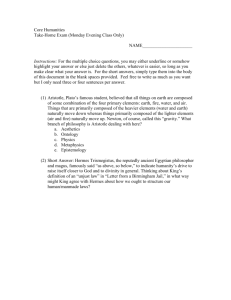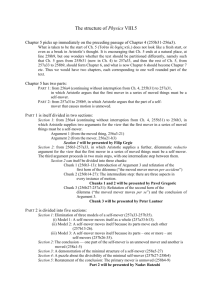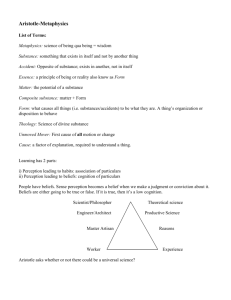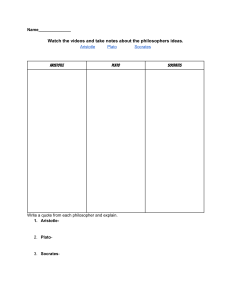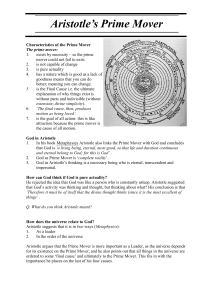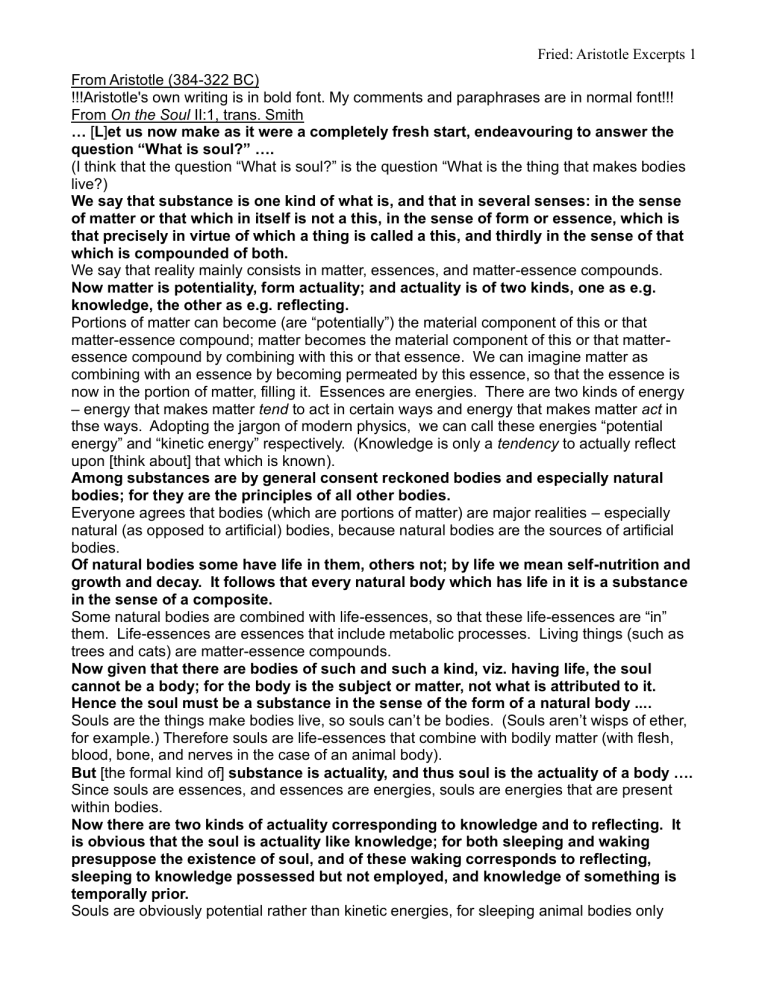
Fried: Aristotle Excerpts 1 From Aristotle (384-322 BC) !!!Aristotle's own writing is in bold font. My comments and paraphrases are in normal font!!! From On the Soul II:1, trans. Smith … [L]et us now make as it were a completely fresh start, endeavouring to answer the question “What is soul?” …. (I think that the question “What is soul?” is the question “What is the thing that makes bodies live?) We say that substance is one kind of what is, and that in several senses: in the sense of matter or that which in itself is not a this, in the sense of form or essence, which is that precisely in virtue of which a thing is called a this, and thirdly in the sense of that which is compounded of both. We say that reality mainly consists in matter, essences, and matter-essence compounds. Now matter is potentiality, form actuality; and actuality is of two kinds, one as e.g. knowledge, the other as e.g. reflecting. Portions of matter can become (are “potentially”) the material component of this or that matter-essence compound; matter becomes the material component of this or that matteressence compound by combining with this or that essence. We can imagine matter as combining with an essence by becoming permeated by this essence, so that the essence is now in the portion of matter, filling it. Essences are energies. There are two kinds of energy – energy that makes matter tend to act in certain ways and energy that makes matter act in thse ways. Adopting the jargon of modern physics, we can call these energies “potential energy” and “kinetic energy” respectively. (Knowledge is only a tendency to actually reflect upon [think about] that which is known). Among substances are by general consent reckoned bodies and especially natural bodies; for they are the principles of all other bodies. Everyone agrees that bodies (which are portions of matter) are major realities – especially natural (as opposed to artificial) bodies, because natural bodies are the sources of artificial bodies. Of natural bodies some have life in them, others not; by life we mean self-nutrition and growth and decay. It follows that every natural body which has life in it is a substance in the sense of a composite. Some natural bodies are combined with life-essences, so that these life-essences are “in” them. Life-essences are essences that include metabolic processes. Living things (such as trees and cats) are matter-essence compounds. Now given that there are bodies of such and such a kind, viz. having life, the soul cannot be a body; for the body is the subject or matter, not what is attributed to it. Hence the soul must be a substance in the sense of the form of a natural body .... Souls are the things make bodies live, so souls can’t be bodies. (Souls aren’t wisps of ether, for example.) Therefore souls are life-essences that combine with bodily matter (with flesh, blood, bone, and nerves in the case of an animal body). But [the formal kind of] substance is actuality, and thus soul is the actuality of a body …. Since souls are essences, and essences are energies, souls are energies that are present within bodies. Now there are two kinds of actuality corresponding to knowledge and to reflecting. It is obvious that the soul is actuality like knowledge; for both sleeping and waking presuppose the existence of soul, and of these waking corresponds to reflecting, sleeping to knowledge possessed but not employed, and knowledge of something is temporally prior. Souls are obviously potential rather than kinetic energies, for sleeping animal bodies only Fried: Aristotle Excerpts 2 tend to perform the actions that they actually perform when they’re awake. (I think that Aristotle should have said that animals, including human beings, are only the bodily components of body-essence compounds, because we say that a cat or a man runs or tends to run, and here it’s a body that runs or tends to run as a result of being combined with the cat-essence or man-essence. But Aristotle instead sees animals as body-essence compounds.) That is why the soul is an actuality of the first kind of a natural body having life potentially in it. The body so described is a body which is organized. … So, souls are potential energies that are combined with bodies. Bodies with which souls can be combined are organized natural bodies. (Clouds and rocks are natural bodies but they aren’t organized.) We must not understand by that which is potentially capable of living what has lost the soul it had, but only what still retains it; but seeds and fruits are bodies which are potentially of that sort. … Souls can’t enter corpses; they can only enter embryos. (I’m imagining the new combination of a soul with a body as the soul’s entry into the body, and an ongoing soul-body combination as the soul’s continuing presence within the body. ) From this it is clear that the soul is inseparable from its body, or at any rate that certain parts of it are (if it has parts), for the actuality of some of them is the actuality of the parts themselves. Yet some may be separable because they are not the actualities of any body at all. … Souls are always this or that body’s energies – except, perhaps, for thought-energy, which would be a part of the human energy that is the human soul. (This would be potential rather than kinetic thought-energy, because the human soul is a potential rather than kinetic energy.) From Metaphysics VII:8, trans. Ross And when we have the whole, such and such a form in this flesh and in these bones, this is Callias or Socrates; and they are different in virtue of their matter (for that is different), but the same in form; for their form is indivisible. This sentence strongly suggests that Aristotle thinks that there’s a single form (essence) for every biological species – a single sycamore-form, a single cat-form, a single man-form. But if souls are forms, and there’s only a single form for every biological species, including for the human species, then all human beings share a single soul! From Metaphysics VII:11, trans. Ross It is clear also that the soul is the primary substance and the body is matter, and man or animal is the compound of both taken universally; and Socrates or Coriscus, if even the soul of Socrates is Socrates, is taken in two ways (for some mean by such a term the soul, and others mean the concrete thing), but if he is simply this particular soul and this particular body, the individual is analogous to the universal. Here Aristotle prefaces with an “if” the proposal that the soul-component of the soul-body compound that is Socrates is a “particular soul” that might itself be seen as Socrates (which is Plato’s view). If this is the case, then the Socrates-soul would be analogous to, say, the catsoul that is shared by all cats. For every nonhuman species there’d be a single soul, but for every local human being there’d be a single soul. Cats would all share the same cat-soul, but my soul would be mine alone and yours would be yours alone. But this isn’t necessarily Aristotle’s own view of how things are, and if we go by the above-quoted statement that Callias and Socrates are “the same in form” then it isn’t his view of how things are. From Metaphysics XII:5, trans. Ross ...[T]he causes of different individuals are different, your matter and form and moving cause being different from mine, while in their universal formula they are the same. Fried: Aristotle Excerpts 3 This sentence appears to contradict the above-statement from Metaphysics VII:8 that Callias and Socrates “are different in virtue of their matter (for that is different), but the same in form; for their form is indivisible.” However, there might not really be any contradiction, for Aristotle might here be using the phrase “universal formula” to designate the same thing (an essence) that he usually designates by means of the word “form”. When he says that one man’s form is different from another man’s form he might have in mind incidental traits that aren’t components of the man-form itself, such as degrees of irritability, intelligence and variations in facial structure and coloration. From Metaphysics XII:7, trans. Ross … [S]ince that which is moved and moves [other things] is intermediate [between that which moves other things without itself moving and that which is moved by other things without itself moving], there is a mover which moves [other things] without being moved, being eternal, substance, and actuality. Aristotle assumes that anything that moves is made to move (is moved) by something else. So, if I raise my arm, then one part of me must be moving another part of me. Aristotle thinks that there has to be something at the beginning of the whole chain of things-moving-things. This First Mover is sometimes called “the unmoved mover” because it supposedly moves other things without itself being moved, and since anything that moves must be made to move by something else, this First Mover could also be called “the motionless mover”. Here the word “move” loosely designates any sort of change at all, but since the heavenly shells in which the stars, planets, sun, and moon are are supposedly embedded are supposedly the first things that are moved, and their rotation is the only way in which they change, and this rotation is motion in the strict sense, Aristotle has motion in the strict sense primarily in mind. Nevertheless, he thinks that the First Mover never changes in any way. In calling the First Mover “eternal” Aristotle may have the First Mover’s unchangingness as well as its everlastingness in mind. If I’m right in seeing the word “substance” as equivalent to the vague phrase “major reality”, then in calling the First Mover “substance” Aristotle is asserting that it’s a major reality – which is pretty obvious. In asserting that the First Mover is “actuality” Aristotle is asserting that it never changes; it’s always actually all that it can be. And the object of desire and the object of thought move in this way; they move without being moved. The primary objects of desire and of thought are the same. For the apparent good is the object of appetite, and the real good is the primary object of wish. But desire is consequent on opinion rather than opinion on desire; for the thinking is the starting-point. When you want something, and when you think that having it would be good for you, you necessarily go for it, maybe even literally moving toward it. Your ultimate goal is to have whatever would be best (most good) for you, and so you go for whatever seems to you to be the thing that would be best for you. So if you believe that having X would be best for you, you’ll go for X. And thought is moved by the object of thought, and one side of the list of opposites [for example, order versus disorder, knowledge versus ignorance, action vs inaction] is itself the object of thought; and in this, substance is first [reality consists in the positive items such as order, knowledge, and inaction, while the negative items such as disorder, ignorance, and inaction, are only absences of reality, and it is these positive items that we truly think about, while the negative items are only blank spots in our thinking], and in substance, that [is first] which is simple [not divisible into parts, and therefore incorporeal] and exists actually. … But the good, also, and that which is in itself desirable are on the same side of the list; and the first in any class is always best, or analogous to the best. … The positives, such as order, knowledge, and action, are the good things and the things that Fried: Aristotle Excerpts 4 we want. The First Mover would be completely positive in every respect and would therefore be completely good and desirable. If the First Mover simply is all of the positives wrapped up together as aspects of a single eternal reality, then we would “have” the First Mover to the extent that we are orderly, knowing, active, and so forth. Maybe Aristotle imagines us as thereby adhering to the First Mover in a lover’s embrace. Thus it [the first mover] produces motion [makes other things move] by being loved [by those other things], and it moves the other moving things [in this way, through their desire to “have” (or to commune with) it]. … [S]ince there is something which moves while itself unmoved, existing actually, this can in no way be otherwise than as it is. … On such a principle, then, depend the heavens and the world of nature. [A principle is a source; the First Mover is the source of other things’ motion, although it doesn’t itself move.] And its life is such as the best which we enjoy, and enjoy for but a short time. For it is evern in this state (which we cannot be), since its actuality is also pleasure. (And therefore waking, perception, and thinking are most pleasant, and hopes and memories are so because of their reference to these.) And thought in itself deals with that which is best in itself, and that which is thought in the fullest sense with that which is best in the fullest sense. By indirectly attributing “waking [and] perception” to the First Mover Aristotle asserts that it is conscious – thoughtfully conscious. But it’s also thoughtful consciousness, as we’re about to see. So, it’s on the one hand a thoughtfully conscious thing and on the other hand a thoughtful consciousness – which seems impossible to me. And since it’s the best thing there is, and thinks about whatever is best, it thinks about itself. And thought thinks itself because it shares the nature of the object of thought; for it becomes an object of thought in coming into contact with and thinking its objects, so that thought and object of thought are the same. For that which is capable of receiving the object of thought, i.e. the substance [the essence (or form, or idea) of whatever is being thought about], is thought. And it is active when it possesses this object. Therefore the latter [essences (or forms, or ideas)] rather than the former [the ability to receive these essences] is the divine element which thought seems to contain, and the act of contemplation is what is most pleasant and best. When we think about things, our thinking consists in the ideas of those things. So, for example, when we think about the predatory nature of cats our thinking is made up of the predation-idea and the felinity-idea and of the relationship between these two ideas. And what’s true of our thinking is true of the First Mover’s thinking. And the First Mover thinks about itself and is its own thinking. So, the First Mover is a self-aware thought-process – which seems impossible to me. Aristotle seems to see the First Mover as being the same thought-process that occurs “within” us when whenever we philosophize. When thoughts flow through us, that’s the First Mover flowing through us. The First Mover would therefore be made up of all of the essences that we can ever bring to mind. The First Mover would therefore be the self-aware system of all essences (or forms, or ideas). If, then, God (the First Mover, who is self-aware thought) is always in that good state in which we sometimes are, this compels our wonder; and if in a better this compels it yet more. And God is in a better state. And life also belongs to God; for the actuality of thought is life, and God is that actuality; and God’s essential activity is life most good and eternal. We say therefore that God is a living being, eternal, most good, so that life and duration continuous and eternal belong to God; for this is God. … I think that when Aristotle says “life” here he means awareness. Fried: Aristotle Excerpts 5 It is clear then from what has been said that there is a substance which is eternal and unmovable and separate from sensible things. If God is the self-aware system of all essences, and these essences are “in” matter (so that the cat-essence is in cat-bodies, for example), how can God be “separate from sensible things”? Maybe Aristotle just means that God has no local body; not even the outermost heavenly shell in which the stars are embedded is His body. But wouldn’t the world as a whole be his body? If the world as a whole isn’t His body, and He’s the self-aware system of essences, then aren’t these essences distinct from the traits that are “in” bodies, and in that case aren’t they basically Plato’s Essences/Forms/Ideas, of which the traits that are in bodies are only copies? It has been shown that this substance [the First Mover] cannot have any magnitude [size], but is without parts and indivisible. [It’s because of this sentence that I interpret Aristotle’s assertion, above, that the First Mover is “simple” as the assertion that the First Mover is incorporeal.] For it produces motion through infinite time [the heavenly shells keep spinning around forever and ever], but nothing finite [in size] has infinite power. And while every magnitude is either infinite or finite, it cannot, for the above reason, have finite magnitude, and it cannot have infinite magnitude because there is no infinite magnitude at all. [There can’t be any infinite magnitude because various impossibilities are entailed by the assertion that there’s an infinitely large thing – for example, if the mile-long segments of a straight stripe drawn throughout this infinite expanse were alternately colored red and blue, and there were black dots at one-inch-intervals all along the entire stripe, there’d be just as many black dots within the red sections of the stripe alone as there’d be within the entire stripe, red and blue segments combined, even though there should only be half as many.] But it is also clear that it is impassive [it can’t be changed by other things] and unalterable …. So, God is an incorporeal, never-changing, everlasting thought-event. I say “thought-event” rather than “thought-process” now because the word “process” suggests that one thing follows another, and the following of one thought by another would be a change. All of the ideas that make up God’s thinking would have to always be there all at once. God wouldn’t experience any passage of time, because He wouldn’t be aware of any event as having followed a previous event – because if He were first aware of X and then of Y He would change from having been presently aware of X but not of Y to now being presently aware of Y, but He doesn’t change. Therefore He wouldn’t be aware of any worldly events – not even of the rotation of the heavenly shells. This was a big problem for medieval thinkers who wanted to reconcile Aristotle’s view of God with their religious view of God as actively guiding worldhistory and responding to people’s prayers.
